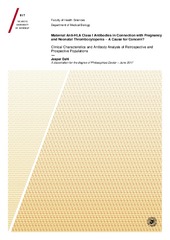Maternal Anti-HLA Class I Antibodies in Connection with Pregnancy and Neonatal Thrombocytopenia – a Cause for Concern? Clinical Characteristics and Antibody Analysis of Retrospective and Prospective Populations
Permanent link
https://hdl.handle.net/10037/11495View/
Thesis (PDF)
Paper I: Dahl, J., Husebekk, A., Acharya, G., Flo, K., Stuge, T. B., Skogen, B., Straume, B., Tiller, H.: “Maternal anti-HLA class I antibodies are associated with reduced birth weight in thrombocytopenic neonates”. Also available in J Reprod Immunol. 2016, 113:27-34. (PDF)
Date
2017-09-08Type
Doctoral thesisDoktorgradsavhandling
Author
Dahl, JesperAbstract
Background: Fetal and neonatal alloimmune thrombocytopenia (FNAIT) is caused by maternal antibodies that target fetal platelets during pregnancy. It can occur when fetal platelets express a paternally-inherited antigen that is not shared by the mother. Maternal antibodies that cause FNAIT are directed against human platelet antigens (HPAs) on fetal platelets, and the resulting fetal/ neonatal thrombocytopenia can range from non-symptomatic to life-threatening. The polymorphic human leukocyte antigens (HLA) class I are also expressed on platelets. It has long been hypothesized that anti-HLA class I antibodies could be a cause of FNAIT, since they are a well-known cause of platelet refractoriness following transfusion, and often appear in cases with suspected FNAIT, both alone and alongside anti-HPA antibodies. Anti-HLA class I antibodies are also a frequent occurrence in uncomplicated pregnancies, and have not been definitively tied to any adverse fetal-maternal outcome, although multiple associations have been reported.
Results: Using retrospective data from the Norwegian National Unit for Platelet Immunology in Tromsø and data from a previous large prospective screening study on FNAIT, we have described the antibody properties and clinical characteristics of cases with suspected FNAIT due to anti-HLA class I antibodies alone, as well as alongside anti-HPA antibodies, and compared these to data from control pregnancies. We found that newborns with suspected FNAIT due to maternal anti-HLA class I antibodies typically had severe thrombocytopenia, and a frequency of intracranial hemorrhage comparable to what is reported for anti-HPA antibody induced FNAIT.
A surprisingly high number of these children were first-borns, and many of the children were also small for gestational age (SGA). An increasing anti-HLA class I antibody level was found to be associated with a decreasing birth weight. Maternal immunization was not tied to any particular HLA class I antigen, but the detected maternal anti-HLA class I antibodies were specific towards paternally-inherited fetal epitopes. Anti-HLA class I antibody levels were higher in cases with suspected FNAIT compared to control pregnancies with detectable anti-HLA class I antibodies. When detected together with anti-HPA-1a antibodies, the presence of anti-HLA class I antibodies was associated with an increased risk of neonatal thrombocytopenia as well as more severe thrombocytopenia, particularly in pregnancies where the mother was nulliparous.
Conclusions: We found that neonates with suspected FNAIT due to maternal anti-HLA class I antibodies not only had severe thrombocytopenia, but that the combination of anti-HLA class I antibodies with neonatal thrombocytopenia was associated with significant perinatal morbidity. Furthermore, we have demonstrated that the additional presence of anti-HLA class I antibodies in HPA-1a alloimmunized pregnancies was associated with an increased risk and severity of neonatal thrombocytopenia. These findings were particularly evident for first-borns. However, since our studies could not address the central question of causality, it remains unclear whether or not the presence of anti-HLA class I antibodies are an epiphenomenon in pregnancies where the neonate develops thrombocytopenia. This question would need to be addressed in a larger prospective study.
Description
The papers 2 and 3 of this thesis are not available in Munin.
Paper II: Dahl, J., Refsum, E., Ahlen, M. T., Egeland, T., Jensen, T., Viken, M. K., Stuge, T. B., Acharya, G., Husebekk, A., Skogen, B., Tiller, H.: “Unraveling the Role of Maternal Anti-HLA Class I Antibodies in Fetal and Neonatal Thrombocytopenia – Antibody Specificity Analysis Using Epitope Data”. (Manuscript). Published version available in J Reprod Immunol. 2017, 122:1-9.
Paper III: Dahl, J., Skogen, B. Kjaer, M., Husebekk, A., Kjeldsen-Kragh, J., Tiller, H.: “Maternal anti-HLA class I antibodies in addition to anti-HPA-1a antibodies influence severity of fetal and neonatal alloimmune thrombocytopenia (FNAIT) – data from a large prospective screening study”. (Manuscript).
Paper II: Dahl, J., Refsum, E., Ahlen, M. T., Egeland, T., Jensen, T., Viken, M. K., Stuge, T. B., Acharya, G., Husebekk, A., Skogen, B., Tiller, H.: “Unraveling the Role of Maternal Anti-HLA Class I Antibodies in Fetal and Neonatal Thrombocytopenia – Antibody Specificity Analysis Using Epitope Data”. (Manuscript). Published version available in J Reprod Immunol. 2017, 122:1-9.
Paper III: Dahl, J., Skogen, B. Kjaer, M., Husebekk, A., Kjeldsen-Kragh, J., Tiller, H.: “Maternal anti-HLA class I antibodies in addition to anti-HPA-1a antibodies influence severity of fetal and neonatal alloimmune thrombocytopenia (FNAIT) – data from a large prospective screening study”. (Manuscript).
Publisher
UiT The Arctic University of NorwayUiT Norges arktiske universitet
Metadata
Show full item recordCollections
Copyright 2017 The Author(s)
The following license file are associated with this item:


 English
English norsk
norsk
